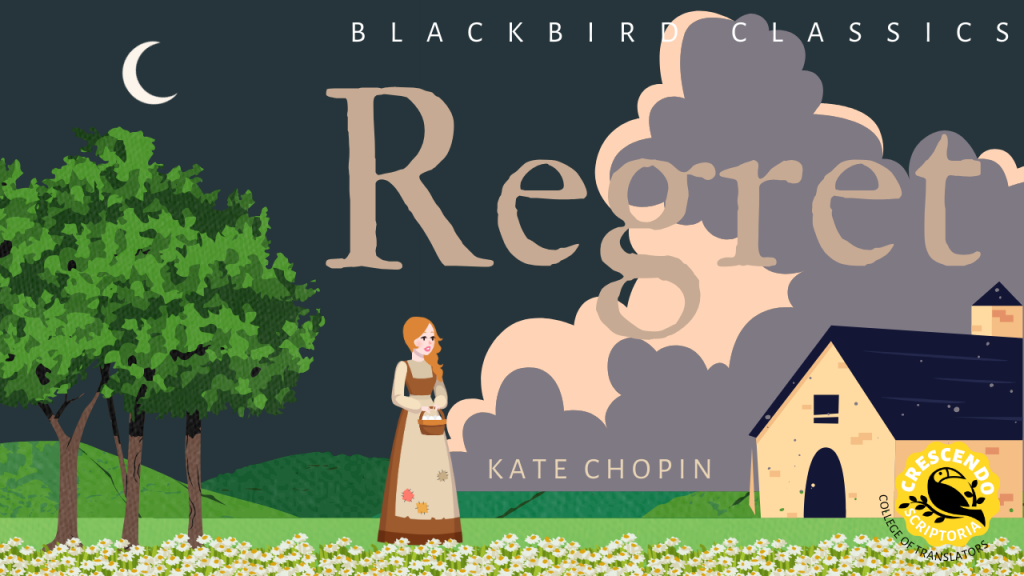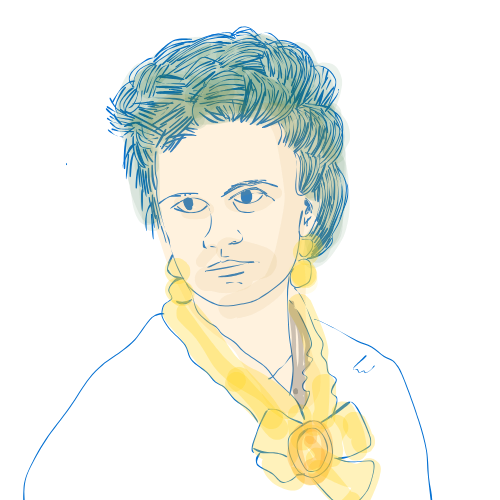50평생 남자를 사랑한 적도 없고 결혼을 생각해본 적도 없는 오렐리 아씨는 누구보다도 열심히 농장을 관리하며 살아가는 여장부다. 그러던 어느날 이웃집 오딜이 아이들을 데리고 찾아오는데…
오렐리 아씨는 아이들을 가만히 쳐다보았다. 그녀는 마르셀린을 뚫어져라라 노려보았다. 아이는 통통한 엘로디를 안고 서서 무게를 이기지 못하고 휘청거리고 있었다. 또한 울고 불며 떼를 쓰는 티놈과 함께 서서 말없이 눈물을 흘리는 마르셀릿도 마찬가지 시선으로 유심히 살펴보았다. 잠깐 이렇게 아이들을 관찰하는 동안 그녀는 정신을 차리고 자신이 무엇을 해야 하는지 찾아내야 했다. 우선 아이들에게 밥을 먹이기로 했다.
1894년 9월 완성된 이 작품은 1895년 5월 출간된 잡지 《센츄리Century》에 처음 발표되었습니다. 이후 1897년 《아카디에서 하룻밤 A Night in Acadie》라는 제목의 단편작품집으로 다시 출간되었습니다.
Per Seyersted는 이 소설에 대해 다음과 같이 평가합니다.
그녀의 작품은 프랑스의 전통과 켈트족의 전통을 최대한 살려낼 줄 아는 천부적인 예술성을 보여준다. 타고난 프랑스적 감성을 지닌 그녀는, 간결하고 명료함, 논리와 정밀함, 효율적인 표현을 추구하는 프랑스적인 형식 위에 넘치지 않는 절제, 연민을 자아내면서도 유머를 잃지 않는 아일랜드식 쾌활한 정서를 절묘하게 배합하는 법을 알고 있다.
Regret
Mamzelle1 Aurélie possessed a good strong figure, ruddy cheeks, hair that was changing from brown to gray, and a determined eye. She wore a man’s hat about the farm, and an old blue army overcoat2 when it was cold, and sometimes topboots.
Mamzelle Aurélie had never thought of marrying. She had never been in love. At the age of twenty she had received a proposal, which she had promptly declined, and at the age of fifty she had not yet lived to regret it.
So she was quite alone in the world, except for her dog Ponto, and the negroes3 who lived in her cabins and worked her crops, and the fowls, a few cows, a couple of mules, her gun (with which she shot chicken-hawks4), and her religion.
One morning Mamzelle Aurélie stood upon her gallery, contemplating, with arms akimbo,5 a small band of very small children who, to all intents and purposes,6 might have fallen from the clouds, so unexpected and bewildering was their coming, and so unwelcome. They were the children of her nearest neighbor, Odile, who was not such a near neighbor, after all.
The young woman had appeared but five minutes before, accompanied by these four children. In her arms she carried little Elodie; she dragged Ti Nomme by an unwilling hand; while Marcéline and Marcélette followed with irresolute steps.
Her face was red and disfigured from tears and excitement. She had been summoned to a neighboring parish by the dangerous illness of her mother; her husband was away in Texas–it seemed to her a million miles away; and Valsin was waiting with the mule-cart to drive her to the station.
“It’s no question, Mamzelle Aurélie; you jus’ got to keep those youngsters fo’ me tell I come back. Dieu sait, I would n’ botha you with ’em if it was any otha way to do! Make ’em mine you, Mamzelle Aurélie; don’ spare ’em. Me, there, I’m half crazy between the chil’ren, an’ Léon not home, an’ maybe not even to fine po’ maman alive encore!”7–a harrowing possibility which drove Odile to take a final hasty and convulsive leave of her disconsolate family.
She left them crowded into the narrow strip of shade on the porch of the long, low house; the white sunlight was beating in on the white old boards; some chickens were scratching in the grass at the foot of the steps, and one had boldly mounted, and was stepping heavily, solemnly, and aimlessly across the gallery. There was a pleasant odor of pinks in the air, and the sound of negroes’ laughter was coming across the flowering cotton-field.8
Mamzelle Aurélie stood contemplating the children. She looked with a critical eye upon Marcéline, who had been left staggering beneath the weight of the chubby Elodie. She surveyed with the same calculating air Marcélette mingling her silent tears with the audible grief and rebellion of Ti Nomme. During those few contemplative moments she was collecting herself, determining upon a line of action which should be identical with a line of duty. She began by feeding them.
If Mamzelle Aurélie’s responsibilities might have begun and ended there, they could easily have been dismissed; for her larder9 was amply provided against an emergency of this nature. But little children are not little pigs; they require and demand attentions which were wholly unexpected by Mamzelle Aurélie, and which she was ill prepared to give.
She was, indeed, very inapt in her management of Odile’s children during the first few days. How could she know that Marcélette always wept when spoken to in a loud and commanding tone of voice? It was a peculiarity of Marcélette’s. She became acquainted with Ti Nomme’s passion for flowers only when he had plucked all the choicest gardenias and pinks for the apparent purpose of critically studying their botanical construction.
” ‘Tain’t enough to tell ‘im, Mamzelle Aurélie,” Marcéline instructed her; “you got to tie ‘im in a chair. It’s w’at maman all time do w’en he’s bad: she tie ‘im in a chair.” The chair in which Mamzelle Aurélie tied Ti Nomme was roomy and comfortable, and he seized the opportunity to take a nap in it, the afternoon being warm.
At night, when she ordered them one and all to bed as she would have shooed the chickens into the hen-house, they stayed uncomprehending before her. What about the little white nightgowns that had to be taken from the pillow-slip in which they were brought over, and shaken by some strong hand till they snapped like ox-whips? What about the tub of water which had to be brought and set in the middle of the floor, in which the little tired, dusty, sunbrowned feet had every one to be washed sweet and clean? And it made Marcéline and Marcélette laugh merrily–the idea that Mamzelle Aurélie should for a moment have believed that Ti Nomme could fall asleep without being told the story of Croque-mitaine10 or Loup-garou,11 or both; or that Elodie could fall asleep at all without being rocked and sung to.
“I tell you, Aunt Ruby,” Mamzelle Aurélie informed her cook in confidence; “me, I’d rather manage a dozen plantation’ than fo’ chil’ren. It’s terrassent! Bonté!12 Don’t talk to me about chil’ren!”
“‘Tain’ ispected sich as you would know airy thing ’bout ’em, Mamzelle Aurélie. I see dat plainly yistiddy w’en I spy dat li’le chile playin’ wid yo’ baskit o’ keys. You don’ know dat makes chillun grow up hard-headed, to play wid keys? Des like it make ’em teeth hard to look in a lookin’-glass. Them’s the things you got to know in the raisin’ an’ manigement o’ chillun.”13
Mamzelle Aurélie certainly did not pretend14 or aspire to such subtle and farreaching knowledge on the subject as Aunt Ruby possessed, who had “raised five an’ bared (buried) six” in her day. She was glad enough to learn a few little mother-tricks to serve the moment’s need.
Ti Nomme’s sticky fingers compelled her to unearth white aprons that she had not worn for years, and she had to accustom herself to his moist kisses–the expressions of an affectionate and exuberant nature. She got down her sewing-basket, which she seldom used, from the top shelf of the armoire,15 and placed it within the ready and easy reach which torn slips and buttonless waists demanded. It took her some days to become accustomed to the laughing, the crying, the chattering that echoed through the house and around it all day long. And it was not the first or the second night that she could sleep comfortably with little Elodie’s hot, plump body pressed close against her, and the little one’s warm breath beating her cheek like the fanning of a bird’s wing.
But at the end of two weeks Mamzelle Aurélie had grown quite used to these things, and she no longer complained.
It was also at the end of two weeks that Mamzelle Aurélie, one evening, looking away toward the crib where the cattle were being fed, saw Valsin’s blue cart turning the bend of the road. Odile sat beside the mulatto, upright and alert. As they drew near, the young woman’s beaming face indicated that her homecoming was a happy one.
But this coming, unannounced and unexpected, threw Mamzelle Aurélie into a flutter that was almost agitation. The children had to be gathered. Where was Ti Nomme? Yonder in the shed, putting an edge on his knife at the grindstone. And Marcéline and Marcélette? Cutting and fashioning doll-rags in the corner of the gallery. As for Elodie, she was safe enough in Mamzelle Aurélie’s arms; and she had screamed with delight at sight of the familiar blue cart which was bringing her mother back to her.
The excitement was all over, and they were gone. How still it was when they were gone! Mamzelle Aurélie stood upon the gallery, looking and listening. She could no longer see the cart; the red sunset and the blue-gray twilight had together flung a purple mist across the fields and road that hid it from her view. She could no longer hear the wheezing and creaking of its wheels. But she could still faintly hear the shrill, glad voices of the children.
She turned into the house. There was much work awaiting her, for the children had left a sad disorder behind them; but she did not at once set about the task of righting it. Mamzelle Aurélie seated herself beside the table. She gave one slow glance through the room, into which the evening shadows were creeping and deepening around her solitary figure. She let her head fall down upon her bended arm, and began to cry. Oh, but she cried! Not softly, as women often do. She cried like a man, with sobs that seemed to tear her very soul. She did not notice Ponto licking her hand.
- Mamzelle: mademoiselle [프랑스어] 영어의 Miss.에 해당하는 경칭. ↩︎
- army overcoat: 군용 오버코트 ↩︎
- negroes: 오늘날에는 인종차별적인 어휘로 여겨지지만 당시 루이지애나에서는 일상적으로 사용된 말이다. ↩︎
- chicken-hawk: 말똥가리 매 ↩︎
- with arms akimbo: 양손을 허리에 짚고 서서 ↩︎
- to all intents and purposes: 사실상, 어쨌거나 (정확하게 일치하지는 않지만 어찌되었든 결과는 같은 상황을 일컫는 말) ↩︎
- “It’s no question, Mamzelle Aurélie; you jus’ got to keep those youngsters fo’ me tell I come back. Dieu sait, I would n’ botha you with ’em if it was any otha way to do! Make ’em mine you, Mamzelle Aurélie; don’ spare ’em. Me, there, I’m half crazy between the chil’ren, an’ Léon not home, an’ maybe not even to fine po’ maman alive encore!”:
“There’s no question, Mamzelle Aurélie; you just have to keep those youngsters for me until I come back. Dieu sait [French: God knows], I wouldn’t bother you with them if there were any other way! Make them mind you [listen to you], Mamzelle Aurélie; don’t spare them. Me, there, I’m half crazy [worried] about the children, and Léon not home, and maybe not even to find my poor maman [French; mother] alive encore [French: still]!”
소설 속에 등장하는 사투리 표현은 크게 소리내어 읽어보면 그 의미를 좀더 쉽게 추측할 수 있다. ↩︎ - flowering cotton-field: 만개한 목화밭 ↩︎
- larder: 식품을 저장해 놓는 큰 찬장 또는 창고 ↩︎
- Croque-mitaine: 전설 속에 등장하는 유령 또는 괴물. 특정한 모양은 없으며, 아이들의 마음 속에서 공포가 구체화 된 것이다. 영어의 보기맨 (Bogeyman, Bogieman, Boogeyman, Boogieman)과 같다. 흔히 아이가 말을 듣지 않을 때 보기맨이 잡아간다고 겁을 준다. ↩︎
- Loup-garoul: 늑대인간 (Werewolf) ↩︎
- It’s terrassent! Bonté!: [프랑스어] It’s so dominating! Goodness! ↩︎
- “‘Tain’ ispected sich as you would know airy thing ’bout ’em, Mamzelle Aurélie. I see dat plainly yistiddy w’en I spy dat li’le chile playin’ wid yo’ baskit o’ keys. You don’ know dat makes chillun grow up hard-headed, to play wid keys? Des like it make ’em teeth hard to look in a lookin’-glass. Them’s the things you got to know in the raisin’ an’ manigement o’ chillun.”:
I didn’t expect you would know anything about them, Miss Aurelie. I knew that plainly yesterday when I saw that little child playing with your basket of keys. You don’t know that makes children growing up hard-headed, to play with keys? It’s like ot makes their teeth hard to look in a looking-glass(mirror). Those are things you have to know for the raising and management of children ↩︎ - did not pretend: ~이라고 주장하지 않는다.
We do not pretend that the past six years have been without problems for us. 지난 6년 동안 우리에게 아무 문제가 없었다고 말하는 것은 아니다.
Within this lecture I cannot pretend to deal adequately with dreams. 이 강의에서 꿈을 제대로 다룬다고 말할 수는 없다.
The book doesn’t pretend to be a great work of literature. 그 책은 위대한 문학작품이라고 주장하지 않는다. ↩︎ - armoire: 장롱. 옷장. ↩︎
Regret
written by Kate Chopin | 김윤경





다양한 전자책 플랫폼에서 찾아볼 수 있습니다.


김윤경
한국외국어대학교 인도어과를 졸업한 후 다년간 영상번역에 종사하며 여러 편의 영화를 우리말로 옮겼고, 현재는 출판 기획 및 전문 번역가로 활동 중이다. 옮긴 책으로는 [점과 선] [먹고 단식하고 날씬해져라] [아이의 감정조절 어떻게 도와줄까] [드림 비즈니스를 잡아라] [돌아온 희생자들] 등이 있다.










